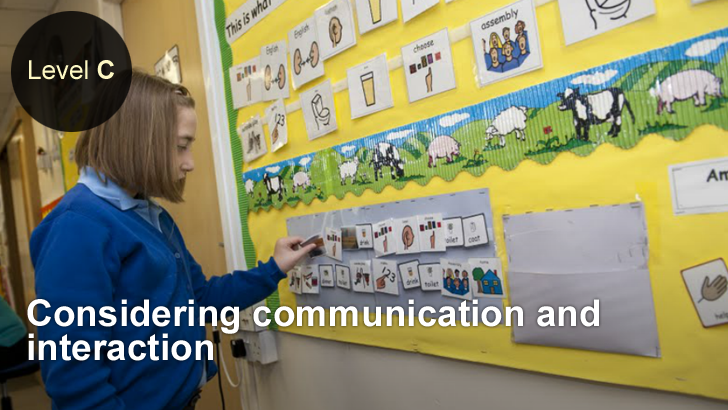
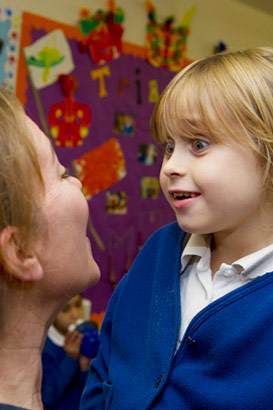
Level C of this module builds upon the learning at level B.
Level B introduces the core challenges that children with SLD/PMLD/CLDD have
with communication and the ways adults can help their communication and language develop.
Using examples, case studies and tasks, level C gives more detail and insight into the patterns of typical development and
how to work with pre-intentional and intentional communicators
It looks at what it means for an adult to be a communication partner and how they can maximise the opportunities for communication.
It also covers the tools, techniques and approaches adults use to help children's communication develop.
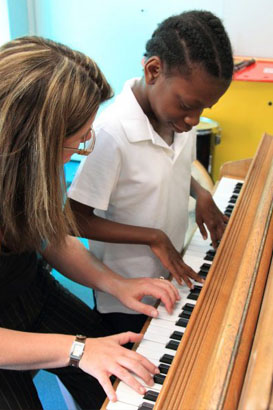
The materials in this level are intended to provide those working with children with SLD/PMLD/CLDD the tools to be able to:
- Explain how children learn to communicate from engaging in early playful interactions, and the importance of establishing this foundation, in addition to functional strategies, for developing meaningful social communication in children;
- Use and evaluate the effectiveness of a range of social and functional communication strategies in planned and spontaneous interactions with children; and
Plan, implement and evaluate a personalised communication intervention for a child in consultation with other professionals, the family and carers.
Details of the professional standards which apply to all teachers in England can be obtained from the Department for Education website. These standards apply to all teachers regardless of their career stage
and all aspects of the standards are relevant to teachers working with children with special educational needs.
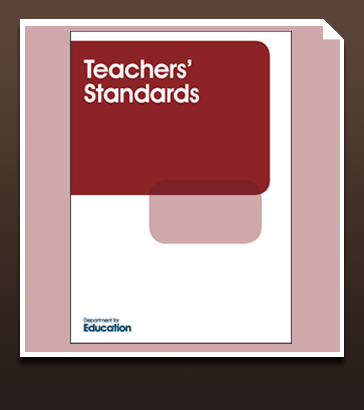
As defined by the Department for Education Special Educational Needs Code of Practice (2001), Children have special educational needs if they have a learning difficulty which calls for special educational provision to be made for them.
Children have learning difficulty if they have:
- A significantly greater difficulty in learning than the majority of children of the same age; or
- A disability which prevents or hinders them from making use of educational facilities of a kind generally provided for children of the same age in schools within the area of the local education authority.
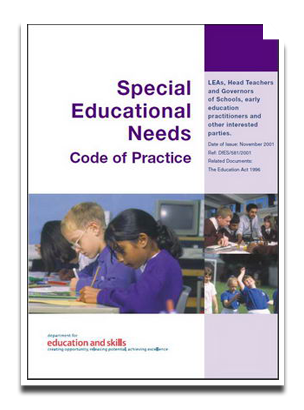
With thanks to the professionals who contributed to this module:
Module Content
Dr Melanie Peter, Senior Lecturer, Anglia Ruskin University
Corinna Cartwright, Headteacher, James Rennie School, Cumbria
All modules produced by The Schools Network and
Real Group (UK) Ltd for the Training Development Agency for Schools (TDA).
Editorial Team
Dr Mark Turner, Real Group (UK) Ltd
Professor Hilary Constable, The Schools Network
Jo Egerton, The Schools Network
Anne Fowlie, The Schools Network
John Truman, The Schools Network
Annie Grant, Independent Consultant
Production and Design
Jonathan Bond, Real Group (UK) Ltd
Colm Gibson, Real Group (UK) Ltd
David Hutter, Real Group (UK) Ltd
Ruth Earl, Real Group (UK) Ltd
Video, Audio and Photography
Atomic Productions
Project Management
Professor Barry Carpenter, The Schools Network
Alan Macgregor, Real Group (UK) Ltd
Sylvia Paddock, The Schools Network
Dr Mark Turner, Real Group (UK) Ltd
Caroline Ward, The Schools Network
Thanks to all the children, parents, carers, assistants and teachers for their involvement.